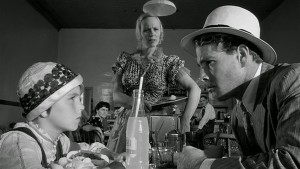How Does A Story Start?
I had been struggling as a screenwriter for about a year when I first heard the concept of the Inciting Incident. Here’s the context from Nobody Wants To Read Your Sh*t:

Tatum O’Neal and Ryan O’Neal in PAPER MOON. “Just because a man meets a woman in a bar room don’t make him your pa!”
I took Robert McKee’s class. It was called Screenplay Structure then. The class was three days—half of Friday and all day Saturday and Sunday. It cost $199, I think. [Check out the 2016 version at www.mckeestory.com.] The class was full of other aspiring screenwriters as well as actors and actresses, studio execs and development guys and gals.
We were all desperate to find out what made a screenplay work.
McKee delivered.
About an hour into Friday evening’s session, he introduced the concept of the Inciting Incident.
The Inciting Incident is the event that makes the story start.
It may come anywhere, McKee said, between Minute One and Minute Twenty-five. But it must happen somewhere within Act One.
It had never occurred to me that a story needed to start.
I thought it started all by itself.
And I certainly had never realized that the writer had to consciously craft that specific moment.
What exactly is an Inciting Incident—as opposed to the story’s “Set-up?”
The inciting incident of The Martian is when Mark Watney (Matt Damon), presumed dead and left behind on Mars, sends a transmission from the abandoned red-planet base that lets the world know he is still alive.
The inciting incident of Taken is when Bryan Mills (Liam Neeson) speaks to his daughter’s kidnappers over the phone.
BRYAN
I don’t know who you are. I don’t know what you want.
If you are looking for ransom, I can tell you I don’t have
money. What I do have is a very particular set of skills …
skills that make me a nightmare for people like you. If you
let my daughter go now, that’ll be the end of it. But if you
don’t, I will look for you, I will find you, and I will kill you.
When the kidnapper answers “Good luck” and hangs up, the story has shifted into gear.
The inciting incident of Star Wars is when Luke retrieves from R2D2’s memory the “mayday” hologram from Princess Leia, who has been captured by Darth Vader and the forces of the Empire.
PRINCESS LEIA
Help me, Obi-Wan Kenobi. You’re my only hope.
The inciting incident of Paper Moon is when nine-year-old orphan Addie Loggins (Tatum O’Neal) is taken up in rural 1930s Kansas by traveling flim-flam man Moses Pray (Ryan O’Neal) and promised to be delivered by him to her only known relative, her aunt Billie, in St. Joseph, Missouri. Moses seems to bear an uncanny physical resemblance to the all-alone-in-the-world Addie.
ADDIE
You my pa?
MOSES
‘Course I ain’t your pa.
ADDIE
You met my mama in a bar room.
MOSES
Just because a man meets a woman in bar room
don’t make him your pa.
The inciting incident of Casablanca is the moment when old flame Ilsa Lund (Ingrid Bergman) steps through the door of Rick Blaine’s (Humphrey Bogart) Cafe Americaine.
RICK
Of all the gin joints in all the towns in all the world,
she walks into mine.
The inciting incident is not the Setup. The setup comes (usually) earlier.
The inciting incident is the moment when the story’s drive-wheels, which have been idly spinning so far, suddenly bite into the surface of the road and, finding traction, begin to propel the story forward.
Over the next few weeks we’re going to explore the idea of the Inciting Incident. We’ll investigate it from these angles:
The difference between the setup and the inciting incident.
The “pole to pole” mechanism that makes the inciting incident generate narrative drive.
The idea that the story’s climax is embedded within the inciting incident.
The imperative that the inciting incident be on-theme.
The connection between the inciting incident and “the call” in the hero’s journey.
And finally, why you and I as writers must know our inciting incident (and understand everything we’re going to ask it to do for us) before we type the first word of our first draft.
[P.S. For Robert McKee fans (and I’m one of ’em), don’t miss his new book Dialogue: The Art of Verbal Action for the Page, Stage, and Screen, just published a couple of weeks ago. A must-read.]



